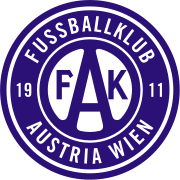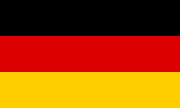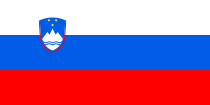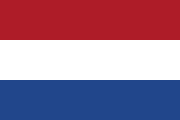FK Austria Wien
 |
|||
| Full name | Fußballklub Austria Wien | ||
|---|---|---|---|
| Nickname(s) | Die Veilchen (The Violets) | ||
| Founded | 12 March 1911 | ||
| Ground | Franz Horr Stadium, Vienna, Austria (Capacity: 13,400) |
||
| Chairman | |||
| Manager | |||
| Coach | |||
| League | Austrian Bundesliga | ||
| 2009–10 | 2nd | ||
|
|||
Fußballklub Austria Wien is an Austrian football club from the Austrian capital city of Vienna. They were the champions of the 2005–06 Austrian Bundesliga. In English, they are commonly referred to as Austria Vienna.
Contents |
History
Foundation to World War II
Austria Wien were founded in Vienna on 12 March 1911 as the Wiener Amateur Sportvereinigung by players and officials of the Vienna Cricket- and Football- Club, taking violet and white as the new club's colours. The team claimed its first championship title in 1924. Amateure changed their name to Austria in 1926 as the former amateurs had become professionals.
The 1930s, one of Austria’s most successful eras brought two Mitropa Cup titles, a predecessor of today’s UEFA Champions League (1933, 1936). During this time world class players like Matthias Sindelar wore the violet jersey.
After the Anschluss and throughout the period of Nazi domination of the country (1938–1945) most of the club’s officials and some players with Jewish heritage, had to flee or were murdered by the Nazi regime. Star player Sindelar died under unresolved circumstances on January 23, 1939 of carbon monoxide poisoning in his apartment. Even though the team did not have any success in this period, playing in the Gauliga Ostmark, they managed a much more important victory in keeping the name "Austria" despite attempts by Nazi sports authorities to rename the club.
Post World War II
Post-World War II started a new successful era with Austria winning national championship titles in 1949, 1950, 1953 and 1961–1963 as well as 1969.
The 1960s marked the beginning of a golden period for Austria Wien, a run of 16 titles in 33 seasons between 1960 and 1993. The decade began with three titles in a row (1961, 1962, and 1963) and ended with two more (1969, 1970) under the management of Ernst Ocwirk. Stars of the 1960s included:
- Horst Nemec, a fine centre-forward rated by some at the time as one of Europe's best
- Ernst Fiala, another fine attacker and inspirational team leader
- Johann Geyer, a cultured yet hard-working midfield schemer
- Horst Hirnschrodt, who played mainly on the right flank
Glorious era in competition and European Cup
The 1970s saw the beginning of another glorious era. Between 1970 and 1975 the club was in a difficult phase. After a bad season 1974–75 (goal difference +7) with a somewhat ageing team, the Violets began to build a young squad with average age 23 years, season 1975–76. All squads in the 5 seasons 1975–1976 till 1979–1980 had an average age of about 23 years at the start of the seasons. The 11 seasons 1975–76 till 1985–86 Austria Wien won 8 national championship titles (1975–76; 1977–78, 1978–79, 1979–80, 1980–81; 1983–84, 1984–85, 1985–86, respective goal differences: +48; +43, +44, +45, +31; +56, +68, +71). After winning the national Cup, season 1976–77, Austria Wien played the European Cup II-final (1977–78), which it lost 4–0 against Rob Rensenbrink's Anderlecht (3 May 1978), the semi-finals of the European Cup I (Champions Cup) were reached season 1978–79. On 7 August 1979, Ajax (with players Ruud Krol, Frank Arnesen, Dick Schoenaker, Soren Lerby, Tscheu La Ling, and Simon Tahamata) were beaten in a friendly match 5–1 (5–0 after 39 minutes). In a friendly match, Anderlecht was beaten this time by a score of 3–0 on 5 August 1980. Since the 1980–81 season, the average age of the successive squads went up to about 25 years at the start of the season.
In 1982–83, the semi-finals of the European Cup II (Cup Winners' Cup)-tournament was reached, in which Real Madrid proved to be too strong. During the next two seasons, Austria Wien were twice stranded in the quarter-finals , in respectively the European Cup III (UEFA-Cup)-tournament season 1983–1984 (goal difference +16 (25–9); Aris Bonnevoie (Luxemburg) was beaten 0–5 away and 10–0 at home (15–0 on aggregate) (1st round), after a 2–0 home win from Stade Laval, away being 3–0 behind in the return match Austria Wien drew 3–3. (2nd round), Internazionale was eliminated: 2–1 home win, 1–1 away draw) (3rd round), before Austria Wien stranded in the quarter finals: 2–0 away loss to Tottenham Hotspur, 2–2 home draw) and the European Cup I Champions Cup season 1984–1985. 3 Successive national championship titles were won, seasons 1983–1984, 1984–1985, 1985–1986 (goal differences +56, +68, +71). In these seasons friendly games against Hungary (5–2, August 31 1983) and Werder Bremen (3–0, August 10 1984) were won. Starting the 1985–1986 season 19 seasons without successes in the European Cup-tournaments followed, and from 1986 on also the championships results were declining and declining, with the lowest point in achievements between 1995 and 2002. Not earlier than the season 2004–2005 Austria Wien again reached the quarter finals in a European Cup-tournament (UEFA Cup-tournament). Some important players playing at Austria Wien in the successful era 1975–1976 till 1985–1986: Herbert "Schneckerl" Prohaska (1972–1980, 1983–1989), Felix Gasselich (1974–1983) who played afterwards at AFC Ajax Amsterdam July 1983 till November 1985, Thomas Parits (1964–1970, 1977–1979), Walter Schachner (1978–1981), Thomas Pfeiler (1978–1983), Gerhard Steinkogler (1980–1986), Alfred Drabits (1981–1988) (nowadays youth-coach at Austria Wien), Toni Polster (1982–1987), the Hungarian ex-international Tibor Nyilasi (1983–1988).
Afterwards also José Alberto Percudani (January 1988–1990), Peter Stoger (1988–1994) and Jewgenij Milewskij (1989–1991) wore the tricot of Austria Wien.
1990s
In the beginning of the '90s, FK Austria enjoyed its so far last successful era: three championship titles (seasons 1990–1991, 1991–1992, 1992–1993; but less brilliant goal differences (+39, +37, +46) than the seasons 1983–1984, 1984–1985, 1985–1986 (+56, +68, +71)), three cup titles (seasons 1989–1990, 1991–1992, 1993–1994) as well as four Super cup titles (Austrian national champion vs. Cup winner) (1991, 1992, 1993, 1994) were won. Internationally there were no successes. The era 1995–2002 in the championships Austria Wien finished at the midst of the table only. The 3 seasons 1996–1997, 1997–1998, 1998–1999 the goal differences had even been negative (−10, −15, −3). Apart from this there had been financial problems, which stopped the club from keeping star-players.
Frank Stronach and the new millennium

After a period without any title (last title season 1992–1993), Austria Wien was taken over by billionaire Frank Stronach of the Magna concern in 1999, the name of the club changing into FK Austria Memphis Magna. He invested much money into the club, buying many top players, so they won the title again in the season 2002–2003 (36 matches, goal difference +31), after a very good start of the season (12 matches, goal difference +19). Despite this coach and ex-player Walter Schachner was fired. His successor Christoph Daum produced weaker results (24 matches, goal difference +12), yet Austria won the national Cup. Austria Wien had a three times higher budget than the average league club (as of 2007 Red Bull Salzburg has the highest budget in the Austrian Bundesliga).
In 2004 the name Memphis was deleted. Austria was known for their very fancy and creative style of playing football which on the downside has frequently led to unnecessary losses and unnecessary draws and makes the team somewhat unpredictable. In the spectacular 2004/05 season the team reached the quarter final of the UEFA Cup, in which the Italian team Parma FC proved to be the better club by eliminating Austria on away goals (1:1, 0:0); in the league Austria finished only 3rd, however, the team wasn't considered weak (goal difference +40 (64–24))! On the 21st of November 2005, Frank Stonach decided to resigne from his post. As a result several players like topscorer Roland Linz, Vladimír Janočko, Joey Didulica, Libor Sionko, Filip Šebo and Sigurd Rushfeldt were transferred or signed contracts for other teams in the summer 2006. The highly successful 2005–2006 season concluded with the league championship (although with a goal difference of +18 (51–33)), and the national Cup against Mattersburg (3–0) under Austria's belt!
The season 2006–2007 seemed to result in a small disaster as the team found it difficult to cope with their significantly reduced budget and resulting loss of most of their key players. After losing 1–4 on aggregate from Benfica in the preliminary round of the Champions League, the team managed to qualify (against Legia Warsaw winning 2–1 on aggregate) for the Group Phase of the UEFA Cup-tournament, but the 1st match was lost 1–4 at home to Zulte Waregem (Belgium). Thomas Parits (ex-player Austria Wien 1964–1970, 1977–1979 and ex-coach Austria Wien 1984–1985) became the new general manager and after losing 3 days later 4–0 away to Salzburg (firing of manager and ex-player Peter Stoger and Dutch coach and ex-football-player Frank Schinkels), Georg Zellhofer became the new coach. In the Group Phase of the UEFA Cup-tournament Austria Wien collected 0 points (goal difference −8 (1–9)), in the entire European Cup-tournament a goal difference of −10 (4–14)! In the league championship things also went completely wrong as the possibility existed that Austria could relegate for the 1st time in history (however, only through mid season). After 21 rounds the club ranked at the bottom of the table (10th, Budesliga). After the winter break Austria managed to finish 6th (midst of the table, goal difference 0 (43–43) in 36 rounds), yet they won the Austrian National Cup, the ÖFB-Stiegl-Cup.
The 1st half of the 2007–2008 season had been a good one as Austria was top of the Bundesliga in week 7 and from weeks 9 through 21. However, performances were not always impressive (round 10 till round 23: 14 rounds, goal difference 0) and Austria dropped to the 3rd position in the league table just before winter break (three-way tie for top at 36 points, goal differential +8). In the UEFA Cup-tournament Austria didn't perform much better than in the 2006–2007 season. Indeed the two qualification rounds (4 matches) had been successful: goal difference +3 (9–6), but in the Group Phase things went wrong again: 4 matches only yielded 1 point and a goal difference of −5 (1–6) (elimination). Total goal difference this tournament had not been that bad as in 2006–2007: -2 (10–12). In the end Austria finished 3rd in the 07/08 Bundesliga, succumbing only to Rapid Vienna and Red Bull Salzburg.
The summer of 2008 brought notable changes for Austria Vienna. Twelve players left the club, among them key players like Sanel Kuljic and Yüksel Sariyar, who went and joined Frank Stronach's newly founded team FC Magna in Austria's second division.
The Betriebsführervertrag with Stronach's company Magna expired, which gave the club a wholly new structure. On July 1, 2008 it was given back its original name FK Austria Wien, without any sponsor name included for the first time in 30 years.Austrian players like Michael Madl, who came back on loan from Wacker Innsbruck, or Lukas Mössner from SK Austria Kärnten joined the team. In addition to them Austria recruited Chinese international Sun Xiang, who became the first Chinese to play in Austria's Bundesliga.
Stadium
FK Austria Wien play their home games at the Franz Horr Stadium which has a total capacity of 12,500 with the new East-Stand.
Achievements
Domestic competitions:
Austrian Bundesliga (23)
- Champions: 1923–24, 1925–26, 1949–50, 1952–53, 1960–61 · 1961–62 · 1962–63, 1968–69, 1969–70, 1975–76, 1977–78 · 1978–79, 1979–80 · 1980–81, 1983–84, 1984–85 · 1985–86, 1990–91, 1991–92, 1992–93, 2002–03, 2005–06
Austrian Cup (27)
- Champions: 1921, 1924, 1925, 1926, 1933, 1935, 1936, 1948, 1949, 1960, 1962, 1963, 1967, 1971, 1974, 1977, 1980, 1982, 1986, 1990, 1992, 1994, 2003, 2005, 2006, 2007, 2009
Austrian Supercup (6)
- Winners:' 1990, 1991, 1992, 1993, 2003, 2004
Wiener Cup (2)
- Winners: 1948, 1949
European competitions:
Mitropa Cup (2)
- Champions: 1933, 1936
- 'Runners Up: 1978
European records
As of December, 2008.
The 1930s, one of Austria’s most successful eras, brought two Mitropa Cup titles, a predecessor of today’s UEFA Champions League (1933, 1936). During this time world class players like Matthias Sindelar wore the violet jersey.
| Season | Competition | Round | Country | Club | Home | Away |
|---|---|---|---|---|---|---|
| 1960–61 | UEFA Cup Winners' Cup | Quarterfinals | Wolverhampton Wanderers | 2–0 | 0–5 | |
| 1961–62 | UEFA Champions League | 1R | Steaua Bucureşti | 2–0 | 0–0 | |
| Quarterfinals | Benfica | 1–1 | 1–5 | |||
| 1962–63 | UEFA Champions League | 1R | HIFK | 5–3 | 2–0 | |
| Quarterfinals | Stade Reims | 3–2 | 0–5 | |||
| 1963–64 | UEFA Champions League | 1R | Górnik Zabrze | 1–0, 1–2 | 0–1 | |
| 1967–68 | UEFA Cup Winners' Cup | 1R | Steaua Bucureşti | 0–2 | 1–2 | |
| 1969–70 | UEFA Champions League | 1R | Dynamo Kyiv | 1–2 | 1–3 | |
| 1970–71 | UEFA Champions League | Qualification | Levski Sofia | 3–0 | 1–3 | |
| 1R | Atlético Madrid | 1–2 | 0–2 | |||
| 1971–72 | UEFA Cup Winners' Cup | Qualification | B 1909 | 2–0 | 2–4 | |
| 1R | Dinamo Tirana | 1–0 | 1–1 | |||
| 2R | Torino | 0–0 | 0–1 | |||
| 1972–73 | UEFA Cup | 1R | Beroe Stara Zagora | 1–3 | 0–7 | |
| 1974–75 | UEFA Cup Winners' Cup | 1R | Waregem | 4–1 | 1–2 | |
| 2R | Real Madrid | 2–2 | 0–3 | |||
| 1976–77 | UEFA Champions League | 1R | Borussia Mönchengladbach | 1–0 | 0–3 | |
| 1977–78 | UEFA Cup Winners' Cup | 1R | Cardiff City | 1–0 | 0–0 | |
| 2R | MFK Košice | 0–0 | 1–1 | |||
| Quarterfinals | Hajduk Split | 1–1 | 1–1 (p 3-0) | |||
| Semifinals | Dynamo Moscow | 2–1 (p 5-4) | 1–2 | |||
| Final | Anderlecht | 0–4 | ||||
| 1978–79 | UEFA Champions League | 1R | Vllaznia Shköder | 4–1 | 0–2 | |
| 2R | Lillestrøm | 4–1 | 0–0 | |||
| Quarterfinals | Dynamo Dresden | 3–1 | 0–1 | |||
| Semifinals | Malmö | 0–0 | 0–1 | |||
| 1979–80 | UEFA Champions League | 1R | Vejle | 1–1 | 2–3 | |
| 1980–81 | UEFA Champions League | 1R | Aberdeen | 0–0 | 0–1 | |
| 1981–82 | UEFA Champions League | 1R | Partizani Tirana | 3–1 | 0–1 | |
| 2R | Dynamo Kyiv | 0–1 | 1–1 | |||
| 1982–83 | UEFA Cup Winners' Cup | 1R | Panathinaikos | 2–0 | 1–2 | |
| 2R | Galatasaray | 0–1 | 4–2 | |||
| Quarterfinals | FC Barcelona | 0–0 | 1–1 | |||
| Semifinals | Real Madrid | 2–2 | 1–3 | |||
| 1983–84 | UEFA Cup | 1R | Aris Bonnevoie | 10–0 | 5–0 | |
| 2R | Stade Lavallois | 2–0 | 3–3 | |||
| 3R | Internazionale | 2–1 | 1–1 | |||
| Quarterfinals | Tottenham Hotspur | 2–2 | 0–2 | |||
| 1984–85 | UEFA Champions League | 1R | Valletta | 4–0 | 4–0 | |
| 2R | Dynamo Berlin | 2–1 | 3–3 | |||
| Quarterfinals | Liverpool | 1–1 | 1–4 | |||
| 1985–86 | UEFA Champions League | 1R | Dynamo Berlin | 2–1 | 2–0 | |
| 2R | Bayern Munich | 3–3 | 2–4 | |||
| 1986–87 | UEFA Champions League | 1R | Avenir Beggen | 3–0 | 3–0 | |
| 2R | Bayern Munich | 1–1 | 0–2 | |||
| 1987–88 | UEFA Cup | 1R | Bayer Leverkusen | 0–0 | 1–5 | |
| 1988–89 | UEFA Cup | 1R | FK Žalgiris Vilnius | 5–2 | 0–2 | |
| 2R | Hearts | 0–1 | 0–0 | |||
| 1989–90 | UEFA Cup | 1R | Ajax | 1–0 | 3–0 | |
| 2R | Werder Bremen | 2–0 | 0–5 | |||
| 1990–91 | UEFA Cup Winners' Cup | 1R | Eintracht Schwerin | 0–0 | 2–0 | |
| 2R | Juventus | 0–4 | 0–4 | |||
| 1991–92 | UEFA Champions League | 1R | Arsenal | 1–0 | 1–6 | |
| 1992–93 | UEFA Champions League | 1R | CSKA Sofia | 3–1 | 2–3 | |
| 2R | Club Brugge | 3–1 | 0–2 | |||
| 1993–94 | UEFA Champions League | 1R | Rosenborg | 4–1 | 1–3 | |
| 2R | FC Barcelona | 1–2 | 0–3 | |||
| 1994–95 | UEFA Cup Winners' Cup | 1R | Branik Maribor | 3–0 | 1–1 | |
| 2R | Chelsea | 1–1 | 0–0 | |||
| 1995–96 | UEFA Cup | Qualification | Kapaz Ganja | 5–1 | 4–0 | |
| 1R | Dinamo Minsk | 1–2 | 0–1 | |||
| 1996 | UEFA Intertoto Cup | Group 3, 1st game | Branik Maribor | 0–3 | ||
| Group 3, 2nd game | Keflavík | 6–0 | ||||
| Group 3, 3rd game | Copenhagen | 1–2 | ||||
| Group 3, 4th game | Örebro | 2–3 | ||||
| 1997 | UEFA Intertoto Cup | Group 9, 1st game | MŠK Žilina | 1–3 | ||
| Group 9, 2nd game | Rapid Bucureşti | 1–1 | ||||
| Group 9, 3rd game | Lyon | 0–2 | ||||
| Group 9, 4th game | Odra Wodzislaw | 1–5 | ||||
| 1998 | UEFA Intertoto Cup | 1R | Ruch Chorzow | 0–1 | 2–2 | |
| 1999 | UEFA Intertoto Cup | 3R | Sint-Truidense | 1–2 | 2–0 | |
| 4R | Rennes | 2–2 | 0–2 | |||
| 2000 | UEFA Intertoto Cup | 2R | Nea Salamina Famagusta | 3–0 | 0–1 | |
| 3R | Ceahlaul Piatra Neamt | 3–0 | 2–2 | |||
| 4R | Udinese | 0–1 | 0–2 | |||
| 2002–03 | UEFA Cup | 1R | Shakhtar Donetsk | 5–1 | 0–1 | |
| 2R | Porto | 0–1 | 0–2 | |||
| 2003–04 | UEFA Champions League | 3QR | Marseille | 0–1 | 0–0 | |
| 2003–04 | UEFA Cup | 1R | Borussia Dortmund | 1–2 | 0–1 | |
| 2004–05 | UEFA Cup | 2QR | Illychivets Mariupol | 3–0 | 0–0 | |
| 1R | Legia Warszawa | 1–0 | 3–1 | |||
| 2R, Group C, 1st game | Real Zaragoza | 1–0 | ||||
| 2R, Group C, 2nd game | Dnipro Dnipropetrovsk | 0–1 | ||||
| 2R, Group C, 3rd game | Club Brugge | 1–1 | ||||
| 2R, Group C, 4th game | Utrecht | 2–1 | ||||
| 3R | Athletic Bilbao | 0–0 | 2–1 | |||
| 4R | Real Zaragoza | 1–1 | 2–2 | |||
| Quarterfinals | Parma | 1–1 | 0–0 | |||
| 2005–06 | UEFA Cup | 2QR | MŠK Žilina | 2–2 | 2–1 | |
| 1R | Viking | 2–1 | 0–1 | |||
| 2006–07 | UEFA Champions League | 3QR | Benfica | 1–1 | 0–3 | |
| 2006–07 | UEFA Cup | 1R | Legia Warszawa | 1–0 | 1–1 | |
| 2R, Group F, 1st game | Zulte-Waregem | 1–4 | ||||
| 2R, Group F, 2nd game | Ajax | 0–3 | ||||
| 2R, Group F, 3rd game | Sparta Prague | 0–1 | ||||
| 2R, Group F, 4th game | Espanyol | 0–1 | ||||
| 2007–08 | UEFA Cup | 2QR | Jablonec | 4–3 | 1–1 | |
| 1R | Vålerenga | 2–0 | 2–2 | |||
| 2R, Group H, 1st game | Bordeaux | 1–2 | ||||
| 2R, Group H, 2nd game | Helsingborg | 0–3 | ||||
| 2R, Group H, 3rd game | Panionios | 0–1 | ||||
| 2R, Group F, 4th game | Galatasaray | 0–0 | ||||
| 2008–09 | UEFA Cup | 1QR | Tobol | 2–0 | 0–1 | |
| 2QR | WIT Georgia | 2–0 | not played | |||
| 1R | Lech Poznan | 2–1 | 2–4 (AET) | |||
| 2009–10 | UEFA Europa League | 3QR | Vojvodina | 1–1 | 4–2 | |
| Play-off | Metalurh Donetsk | 2–2 | 3–2 (AET) | |||
| Group L | Athletic Bilbao | 0–3 | 0–3 | |||
| Group L | Nacional | 1–1 | 1–5 | |||
| Group L | Werder Bremen | 2–2 | 0–2 | |||
| 2010–11 | UEFA Europa League | 2QR | Široki Brijeg | 2–2 | 1–0 | |
| 3QR | Ruch Chorzów | 3–1 | 3-0 | |||
| Play-off | Aris | 1-1 | 0–1 |
Current squad
As of July 9, 2010 Note: Flags indicate national team as has been defined under FIFA eligibility rules. Players may hold more than one non-FIFA nationality.
|
|
Austria Wien Amateur squad
Note: Flags indicate national team as has been defined under FIFA eligibility rules. Players may hold more than one non-FIFA nationality.
|
|
Famous/Notable players
|
|
|
Manager History
- See also .
 Hermann Stessl (1977–1979)
Hermann Stessl (1977–1979) Wenzel Halama (1982–1984)
Wenzel Halama (1982–1984) Thomas Parits (1984–1985)
Thomas Parits (1984–1985) Hermann Stessl (1985–1986)
Hermann Stessl (1985–1986) Thomas Parits (1986–1987)
Thomas Parits (1986–1987) August Starek (1988–1989)
August Starek (1988–1989) Herbert Prohaska (1990–1992)
Herbert Prohaska (1990–1992) Hermann Stessl (1992–1993)
Hermann Stessl (1992–1993) Josef Hickersberger (1993–1994)
Josef Hickersberger (1993–1994) Egon Coordes (1994–1995)
Egon Coordes (1994–1995) Horst Hrubesch (1995–1996)
Horst Hrubesch (1995–1996) Walter Skocik (1996–1997)
Walter Skocik (1996–1997) Wolfgang Frank (1997–1998)
Wolfgang Frank (1997–1998) Robert Sara (1998, caretaker)
Robert Sara (1998, caretaker) Zdenko Verdenik (1998–1999)
Zdenko Verdenik (1998–1999) Friedrich Koncilia (1999, caretaker)
Friedrich Koncilia (1999, caretaker) Herbert Prohaska (1999–2000)
Herbert Prohaska (1999–2000) Ernst Baumeister (2000, caretaker)
Ernst Baumeister (2000, caretaker) Heinz Hochhauser (2000–2001)
Heinz Hochhauser (2000–2001) Arie Haan (2001)
Arie Haan (2001) Walter Hörmann and Anton Pfeffer (2001)
Walter Hörmann and Anton Pfeffer (2001) Dietmar Constantini (2002, caretaker)
Dietmar Constantini (2002, caretaker) Walter Schachner (2002)
Walter Schachner (2002) Christoph Daum (2002–2003)
Christoph Daum (2002–2003) Joachim Löw (2003–2004)
Joachim Löw (2003–2004) Günther Kronsteiner (2004–2005)
Günther Kronsteiner (2004–2005) Peter Stöger (2005)
Peter Stöger (2005) Frank Schinkels (2006)
Frank Schinkels (2006) Georg Zellhofer (2006–2008)
Georg Zellhofer (2006–2008) Dietmar Constantini (2008, caretaker)
Dietmar Constantini (2008, caretaker) Karl Daxbacher (2008–present)
Karl Daxbacher (2008–present)
External links
- Official Website (German)
- Austria Wien at UEFA.COM
- Austria Wien at EUFO.DE
- Austria Wien at Weltfussball.de
- Austria Wien at Playerhistory.com
- Austria Wien at Transfermarkt.de
- Austria Wien at Football Squads.co.uk
- Austria Wien at National Football Teams.com
- Austria Wien at Football-Lineups.com
|
||||||||||||||||||||
|
|||||
|
||||||||||||||
|
|||||||||||||||||